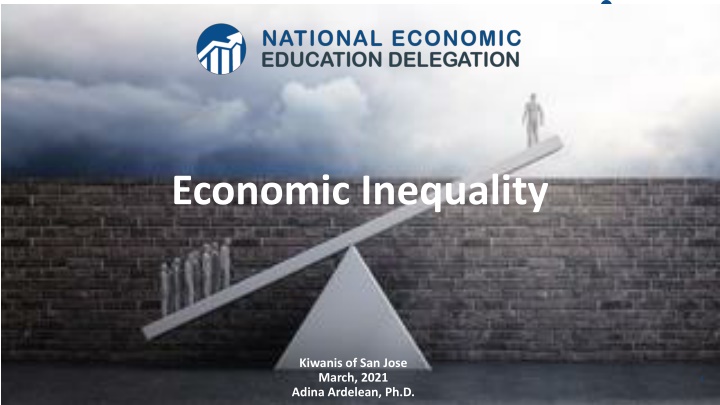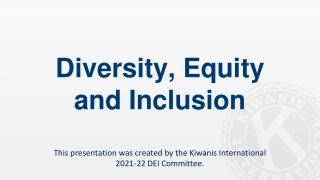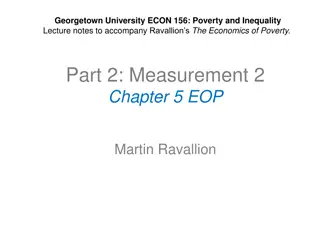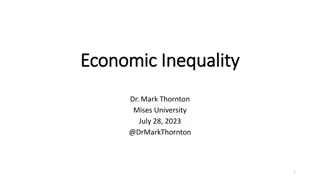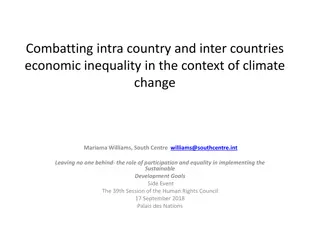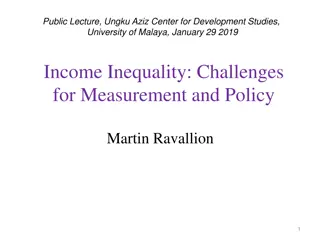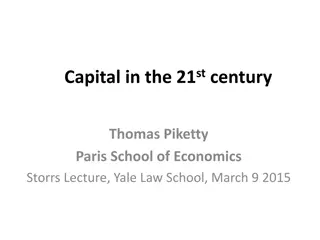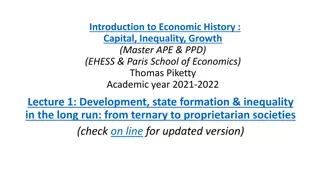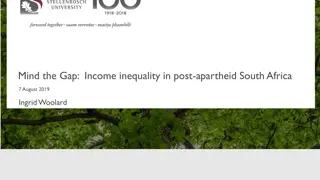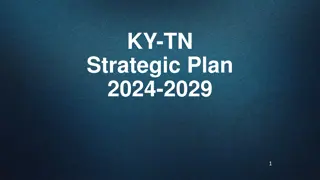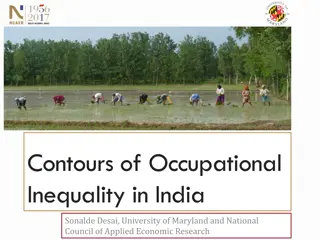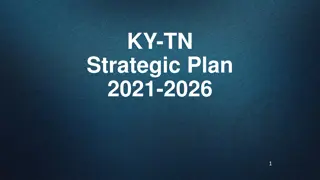Economic Inequality: Kiwanis of San Jose
National Economic Education Delegation's mission to promote understanding of policy issues through nonpartisan presentations. Honorary board includes esteemed economists. Discusses income inequality and ways of thinking about inequality.
Download Presentation

Please find below an Image/Link to download the presentation.
The content on the website is provided AS IS for your information and personal use only. It may not be sold, licensed, or shared on other websites without obtaining consent from the author.If you encounter any issues during the download, it is possible that the publisher has removed the file from their server.
You are allowed to download the files provided on this website for personal or commercial use, subject to the condition that they are used lawfully. All files are the property of their respective owners.
The content on the website is provided AS IS for your information and personal use only. It may not be sold, licensed, or shared on other websites without obtaining consent from the author.
E N D
Presentation Transcript
Economic Inequality Kiwanis of San Jose March, 2021 Adina Ardelean, Ph.D. 1
National Economic Education Delegation Vision - One day, the public discussion of policy issues will be grounded in an accurate perception of the underlying economic principles and data. Mission - NEED unites the skills and knowledge of a vast network of professional economists to promote understanding of the economics of policy issues in the United States. NEED Presentations - Are nonpartisan and intended to reflect the consensus of the economics profession. 2
Who Are We? Honorary Board: 53 members - 2 Fed Chairs: Janet Yellen, Ben Bernanke - 6 Chairs Council of Economic Advisers o Furman (D), Rosen (R), Bernanke (R), Yellen (D), Tyson (D), Goolsbee (D) - 3 Nobel Prize Winners o Akerlof, Smith, Maskin Delegates: 585+ members - At all levels of academia and some in government service - All have a Ph.D. in economics - Crowdsource slide decks - Give presentations Global Partners: 44 Ph.D. Economists - Aid in slide deck development 3
Credits and Disclaimer This slide deck was authored by: - Jon Haveman, Executive Director of NEED This slide deck was reviewed by: - Timothy Smeeding, University of Wisconsin - Robert Wright, Augustana University Disclaimer - NEED presentations are designed to be nonpartisan - It is, however, inevitable that the presenter will be asked for and will provide their own views - Such views are those of the presenter and not necessarily those of the National Economic Education Delegation (NEED) 5
Outline Definition What happened? Does it matter? Is it a problem? What to do about it 7
Income Inequality Definition: - The extent to which the distribution of income deviates from complete equality - The dispersion of income throughout the economy 8
Different Ways of Thinking About Inequality Income Inequality - Before taxes and transfers - After taxes and transfers Wealth Inequality Consumption Inequality 9
National Income Inequality: Share of Top 10% Stock Market Crash WWII Housing Bubble Dot-com Bubble 10
Most of the Action Is at the Top: Pre-Tax Projected 2021 11 CBO: Projected Changes in the Distribution of Household Income, 2016 to 2021
Most of the Action Is at the Top: After-Tax Projected 12 CBO: Projected Changes in the Distribution of Household Income, 2016 to 2021
Wealth Inequality Exceeds Income Inequality 13 Source: Chad Stone, Danilo Trisi, Arloc Sherman, and Roderick Taylor, A Guide to Statistics on Historical Trends in Income Inequality, Center on Budget and Policy Priorities, Policy Futures, May 15, 2018, page 15, Figure 4.
Racial Wealth Inequality 14 Source: How to fix Economic Inequality?, Peterson Institute of International Economics, 2020
Outline Definition What happened? Does it matter? Is it a problem? What to do about it 15
Where Does Inequality Come From? Labor Characteristics - Demographics o Age distribution - Personal Choices o Educational attainment o Household composition - Immigration Market Forces - Technology - Globalization - Competition for labor Government Policy - Market influence - Redistribution
Labor Income is Unhinged from Productivity Why? Declining unionization Globalization Immigration Competition policy Cheap technology
Government Policy and Inequality Market Influence: PRE- distribution - Characteristics of labor o Access to education - Effects on labor demand o Market regulation Competition policy o Labor regulations Minimum wage, overtime, health insurance, etc. RE-distribution - Tax Rates - Income support o Direct aid o Food stamps 19
Tax and Transfer Programs and Inequality 2014 20 Source: U.S. Congressional Budget Office, The Distribution of Household Income, 2014 , Average Income Before and After Means-Tested Transfers and Federal Taxes, by Income Group, 2014.
What About Tax Rates? 1992-2014 +310% -12% Source: IRS, Statistics of Income Division, December 2016.
Dramatically Less Progressivity in the Tax Code 1961 to 2011 22 Source: New York Times, from Thomas Piketty, Emmanuel Saez and Gabriel Zucman, Distributional National Accounts: Methods and Estimates for the United States
The Coronavirus crisis Source: The New York Times, March, 2021
Outline Definition What happened? Does it matter? Is it a problem? What to do about it 24
Why Does Inequality Matter? Too little inequality can: - Reduce individual motivation - Slow economic growth Too much inequality can: - Slow growth - Reduce individual motivation Too much inequality may also: - Divide society - Distort political environment - Reduce political participation - Reduce investments in public goods o Education o Environmental protections
The American Dream is fading Percent of US children earning more than their parents at age 30 by year of birth, 1940-1984 27 Source: How to fix Economic Inequality?, Peterson Institute of International Economics, 2020
Outline Definition What happened? Does it matter? Is it a problem? What to do about it 29
Addressing Inequality: Immediately Available Policy Solutions (1/2) Redistribution (Tax and Social Safety Net Policies) - Tax and transfer programs PRE-distribution (Labor Policies) - Strengthen labor unions - Minimum wages - Collective bargaining - Other policies that favor labor over business owners
Addressing Inequality: Immediately Available Policy Solutions (2/2) Corporate Regulation Policies - Reverse trends in market power Locally - Employment services: job training, interview skills, or assistance with day-to- day issues, such as child care - Cognizance of the potential for technologies to affect worker/employer power dynamics o Uber, Lyft, etc.
Addressing Inequality: Long Term It s all about access to resources: - Education, in particular o Improve public education o Reduce disparities in quality of public education o Improve counseling in low-income schools With respect to college paths to success and funding o Investments are needed in early education, not later (e.g. universal pre-k) - Opportunities for wealth-building - Housing Initiatives whose impacts cross neighborhood and class lines and increase upward mobility specifically for black men - Mentoring programs for black boys, efforts to reduce racial bias among whites, interventions to reduce discrimination in criminal justice, and efforts to facilitate greater interaction across racial groups.
Tension in Policy Solutions Is it possible to increase growth at the same time that you reduce income inequality? - Common refrain among some that government intervention in the economy is always and everywhere bad for growth. Possibly: expanding equality of access promotes the full utilization of resources. - Expanding equality of access requires resources likely from the well-to-do. 33
Summary Income inequality is clearly increasing. - The economy is clearly favoring owners of productive resources over labor. The causes appear to be largely driven by: - The market technology, competition, and trade - Changing institutions. Open questions are: - To act or not to act? - If so, how? The level of inequality is a policy choice.
Thank you! Any Questions? www.NEEDelegation.org Adina Ardelean atardelean@scu.edu Contact NEED: info@needelegation.org Submit a testimonial: www.NEEDelegation.org/testimonials.php Become a Friend of NEED: www.NEEDelegation.org/friend.php 35
